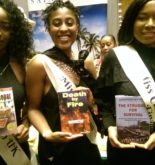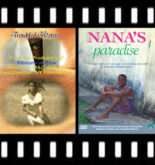St. Lucia’s Nobel Laureates, Sir Arthur Lewis and Sir Derek Walcott, are big feathers in the cap of the nation and draw as much attention to the island as its annual carnival, pristine beaches, honeymoon hotels, and World Heritage Pitons. After all, its Nobel Laureates have given it the boasting rights of possessing the world’s highest per capita Nobel Prizes. Understandably, each year the country sets aside the whole month of January to commemorate the achievements of its Nobel Laureates.
Both Nobel Laureates were born, raised, and attended primary and secondary schools in Castries, so the the Nobel Laureate Tour is centered around the city.
As such we begin the tour at St. Mary’s College, at Vigie, close to the airport, on the westside of Castries. Then we gravitate to the City Center to visit the Central Library, the Derek Walcott Square, the Cathedral Minor Basilica of the Immaculate Conception, and Castries City Hall. Next, we trek to the eastside of Castries to visit the Derek Walcott House. We then leave Castries behind and climb the steep Morne Fortune to visit the Derek Walcott Library, the Sir Arthur Lewis Community College, and the burial grounds of the Nobel Laureates.
1. St. Mary’s College
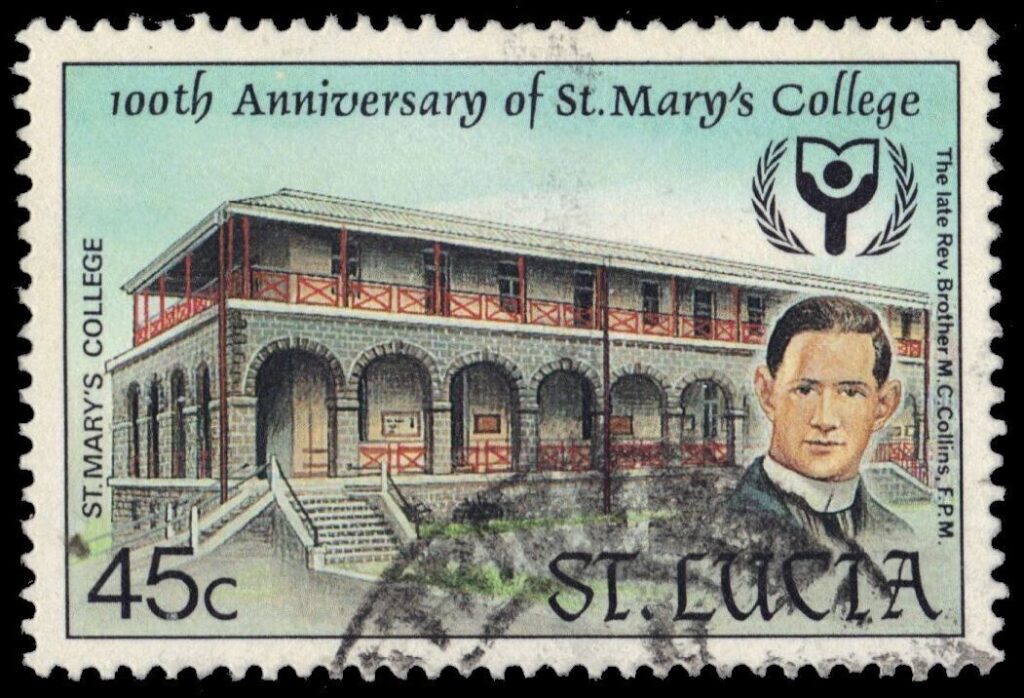
Coined the Caribbean’s Nobel Laureate School (by Sir Calixte George in his 817-page book on the school), both Derek Walcott and Arthur Lewis attended St. Mary’s College. In The Schooner Flight, Walcott said, “I had a sound colonial education,” of which one suspects St. Mary’s College was a large part. The secondary school was one of Walcott’s early immersions in classical literature and would have definitely spurred his love for the arts.
2. Castries Central Library
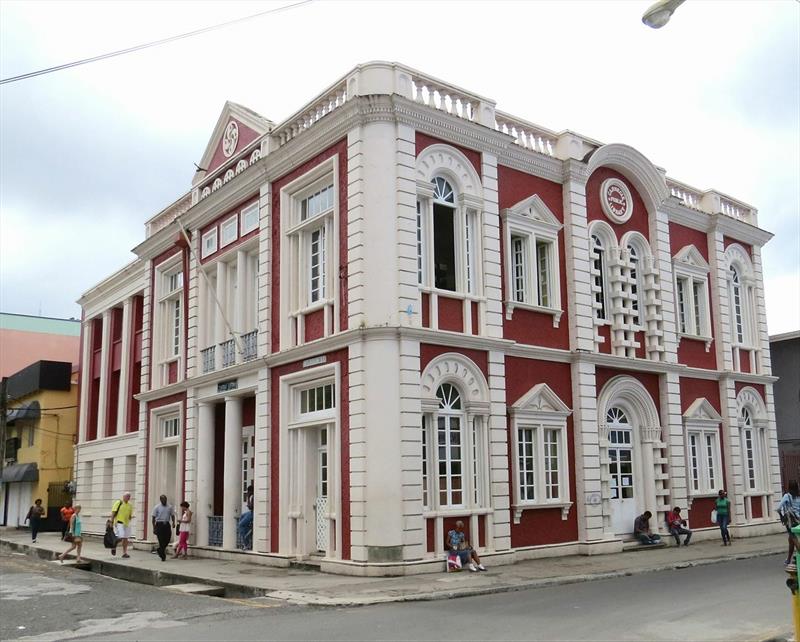
Located at the corner of Micoud and Bourbon Streets, Castries Central Library first opened in 1924 with funding from the Carnegie Trust and the Castries Town Board. The library was closed for two years (reopened in 1950) after it was gutted by the great 1948 fire that scorched three-quarters of Castries and which had inspired eighteen-year-old Walcott to pen what would become one of his most famous poems, A City’s Death by Fire. In this poem Walcott said, “By the smoking sea, where Christ walked, I asked, why Should a man wax tears, when his wooden world fails? The library was rebuilt in 1958 with the financial assistance of the Colonial Development and Welfare Grant and expanded to its present size in 1979 with funding from the World Development Fund, CIDA, and the Manitoba Association. As avid readers, the library would no doubt have been one of the favorite hangouts of our future Nobel Laureates’ and would have formed an important part of their formative years and, therefore, a fitting stop on our tour.
3. Derek Walcott Square
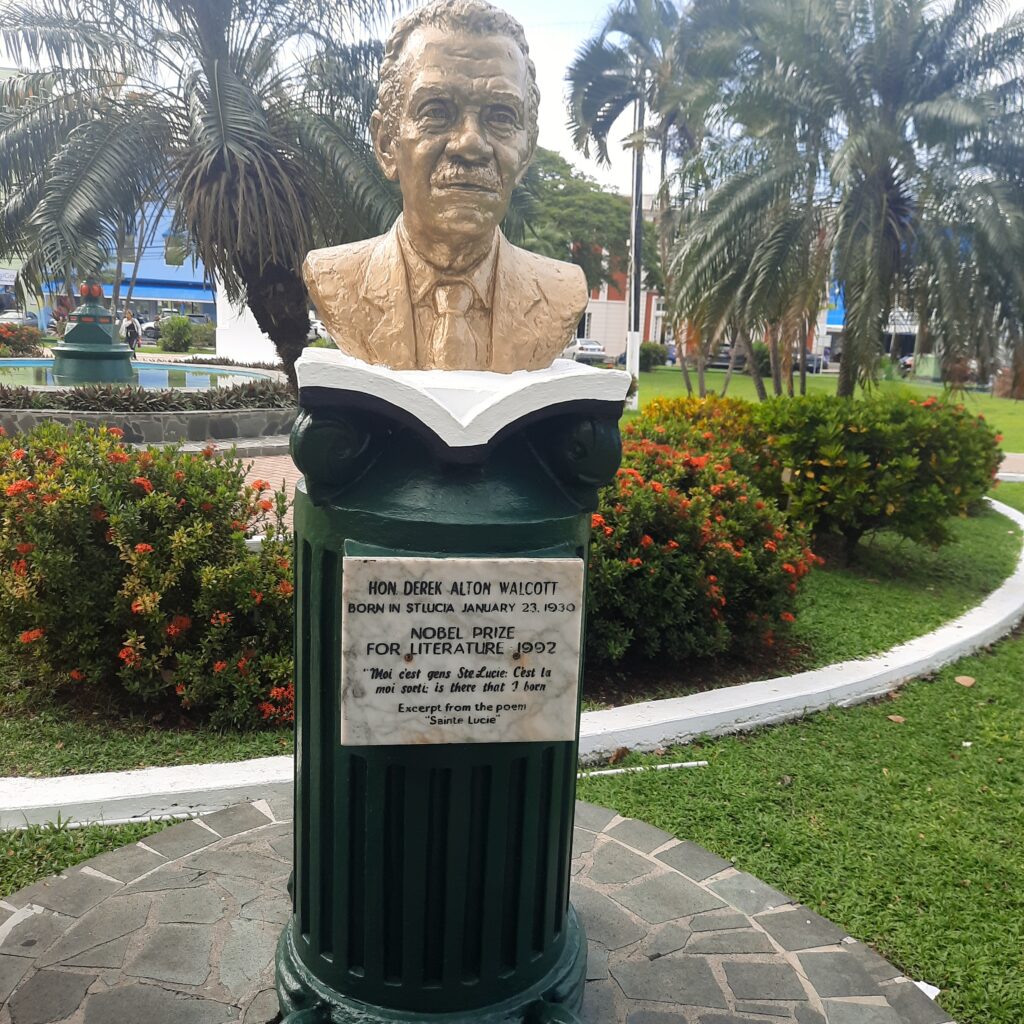
Directly across Bourbon Street from the Central Library is the Derek Walcott Square, framed on its other three sides by Brazil, Laborie and Micoud Streets. Derek Walcott Square is to Castries and St. Lucia what Times Square is to New York and Trafalgar Square is to London. The Square is a popular venue for New Year’s festivities and the world-renowned St. Lucia Jazz and Arts Festival. Over the years, the name of the Square has changed from Place d’Armes, to Promenade Square, to Columbus Square in 1892, and then to Derek Walcott Square in 1993 to commemorate Walcott winning the Nobel Prize for literature. The busts of Sir Arthur Lewis and Sir Derek Walcott are prominently displayed in the Square. Besides the busts, the Derek Walcott Square features a monument to St. Lucians who lost their lives in World War II, and it boasts the Massav Tree, a 400-year-old Samaan tree, considered the island’s oldest tree.
4. Castries Cathedral
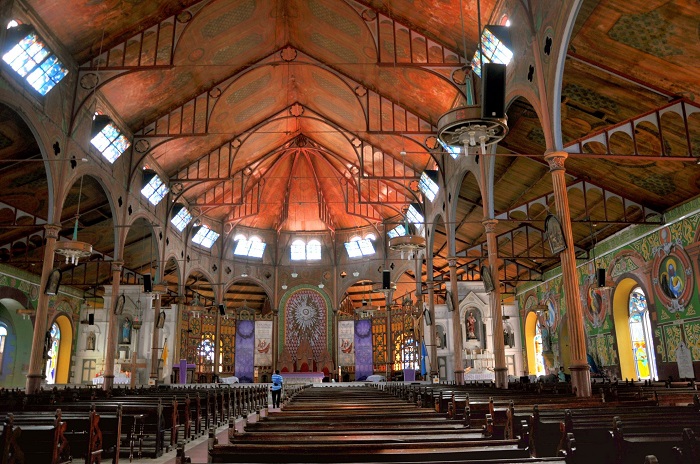
The Castries Cathedral, Minor Basilica of the Immaculate Conception, named after Mary, mother of Jesus, under her title, Our Lady of the Immaculate Conception, sits directly across from Derek Walcott Square. Built in 1897, it is the largest church in the Caribbean, measuring 200 ft long (61 m) by 100 ft wide (30 m), and its interior is decorated by a mural by renowned St. Lucian artist Sir Dunstan St. Omer, who was a friend and contemporary of Walcott. The Metropolitan Archbishop of Castries, Sir Gabriel Malzaire, is another famous son of the soil. Walcott was born and raised as a Methodist and attended a Methodist elementary school. In his poetry, he hinted that coming from a Methodist family (along with his mulatto complexion) made him an outsider in St. Lucia’s Roman Catholic-dominated society. Nonetheless, his funeral service, attended by professors, writers, media, government officials and dignitaries from around the world, was held at the Castries Roman Catholic Cathedral.
5. Castries City Hall
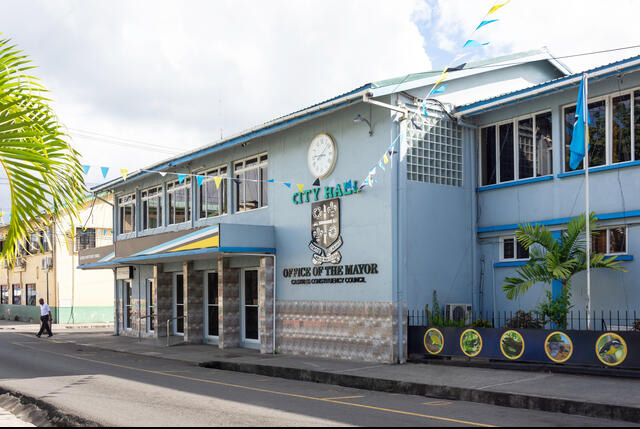
Derek and Roderick Walcott were at the forefront of the 1950s St. Lucia Arts Guild that led the way in West Indian theatre and sparked a cultural renaissance whose reverberations are still being felt today because the Guild served not only as the cradle of St. Lucia’s most renowned cultural creators but inspired a second and third generation of artists. In fact, the St. Lucia Renaissance has been compared with the Harlem Renaissance that preceded it by about twenty-five years. Just round the corner from the Central Library and the Derek Walcott Square, and looking out onto Constitution Park, is Castries City Hall, which was at the center of the Guild’s activities and its unofficial theatre house.
6. The Walcott House
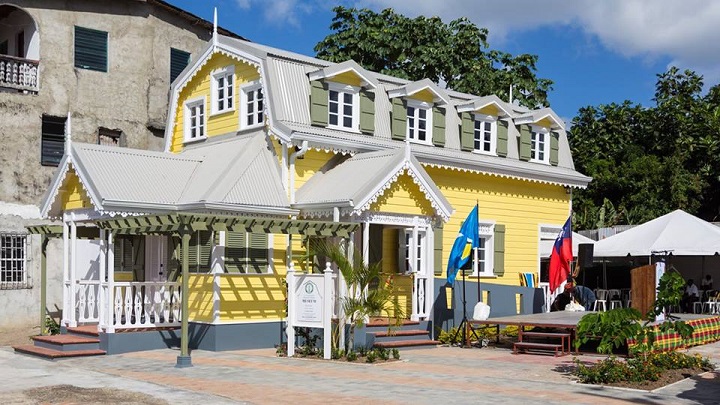
Located on Chaussee Road, eastside of Castries, the childhood home of Derek Walcott, his twin brother Roderick, and his sister Pamela, has been restored to serve as a museum of the life and works of the twin brothers. In an interview, Walcott said, “We had a nice house, with nice flowers around it, and a little front porch; a little upstairs house, that was very well kept, and I went to school there with my mother teaching.” Upon visiting his childhood home before the transformation to a museum, the poet said (in Omeros), “Our house with its bougainvillea trellises, the front porch gone, was a printery. In its noise, I was led up the cramped stair to its offices. I saw the small window near which we slept as boys, how close the roof was. The heat of the galvanize. A desk in my mother’s room, not that bed, sunlit, with its rose quilt where we were forbidden to sit.”
7. Sir Arthur Lewis Community College
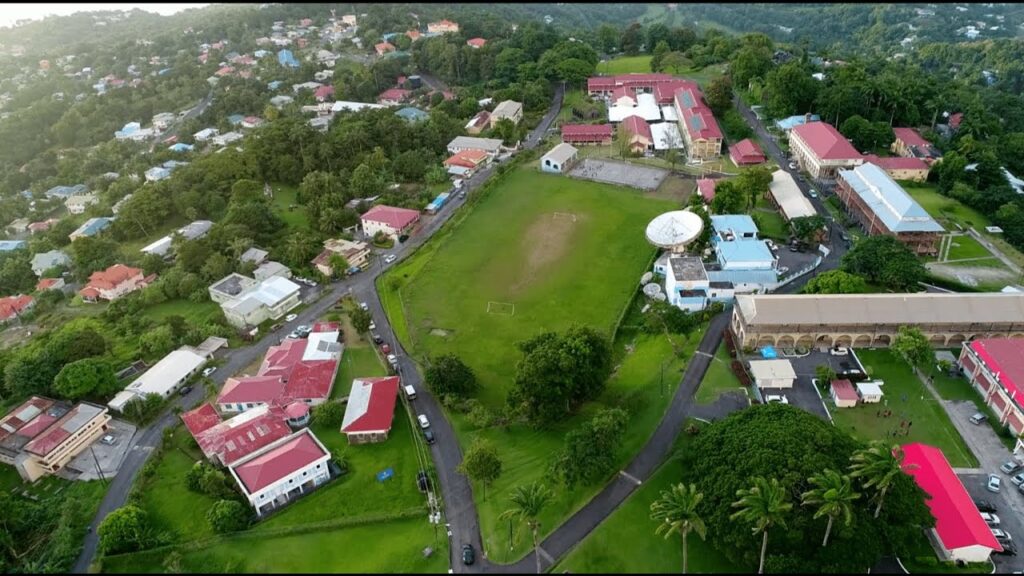
Sitting on top of Morne Fortune, Sir Arthur Lewis Community College is St. Lucia’s premier educational institution. But that wasn’t always the case. During the colonial era, as a military complex, Morne Fortune was the theatre of many battles between the French and English for control of the island, and so education was the least of its preoccupations. Turning history on its head, the military ruins were since refurbished and converted into an educational complex and named after Sir William Arthur Lewis as part of honoring his Nobel achievements. So now instead of Morne Fortune serving as the battleground of territorial conquest, it serves as the frontline of the nation’s higher learning. Sir Arthur Community College is perhaps the world’s most picturesque college campus. The restored military ruins imbue it with a rustic, historical atmosphere, and being on top of Morne Fortune, it offers a panoramic view of Castries and the surrounding vista.
8. The Derek Walcott Library
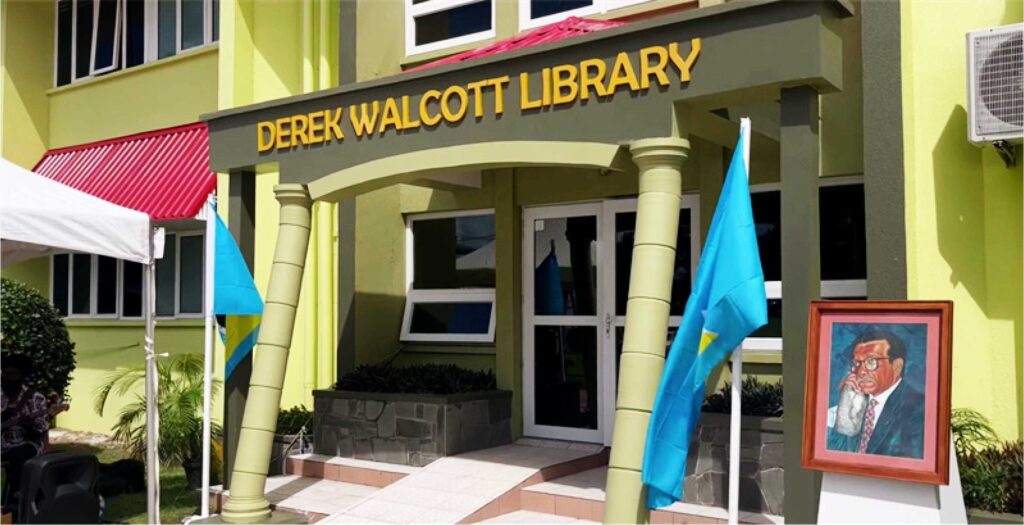
Situated on the grounds of Sir Arthur Lewis Community College, the Derek Walcott Library houses a collection of books and literary pieces written by and about Sir Derek Walcott. Most of the pieces were from his own personal collection and were donated to the school by his partner, Sigrid Nama.
9. Nobel Laureate Burial Ground

Both Sir Arthur Lewis and Sir Derek Walcott are buried on the grounds of Sir Arthur Lewis Community College at the memorial site of the Royal Inniskillin Fusiliers. Each year, as part of the Nobel Laureate Festival, a Nobel Laureate Wreath Laying Ceremony is held at the college, where wreaths are laid at the gravesites of these two favorite sons of the soil and their works immortalized by a distinguished St. Lucian. The Nobel Laureates share much in common. Claudia McDowell of the Star Newspaper said it well when reporting on Walcott’s state funeral procession and service. “He (Sir Derek Walcott) and Sir Arthur Lewis shared the same birthday, national honour and homeland, equal Nobel Prize recognition, and now the same burial location.” And to this we can add that both laureates were products of St. Mary’s College and were raised by single moms since their fathers died when they were still in childhood.
Other Related Links
Festival & Events
The Roman Catholic Churches of St. Lucia
The Murals of Dunstan St. Omer
![]()

